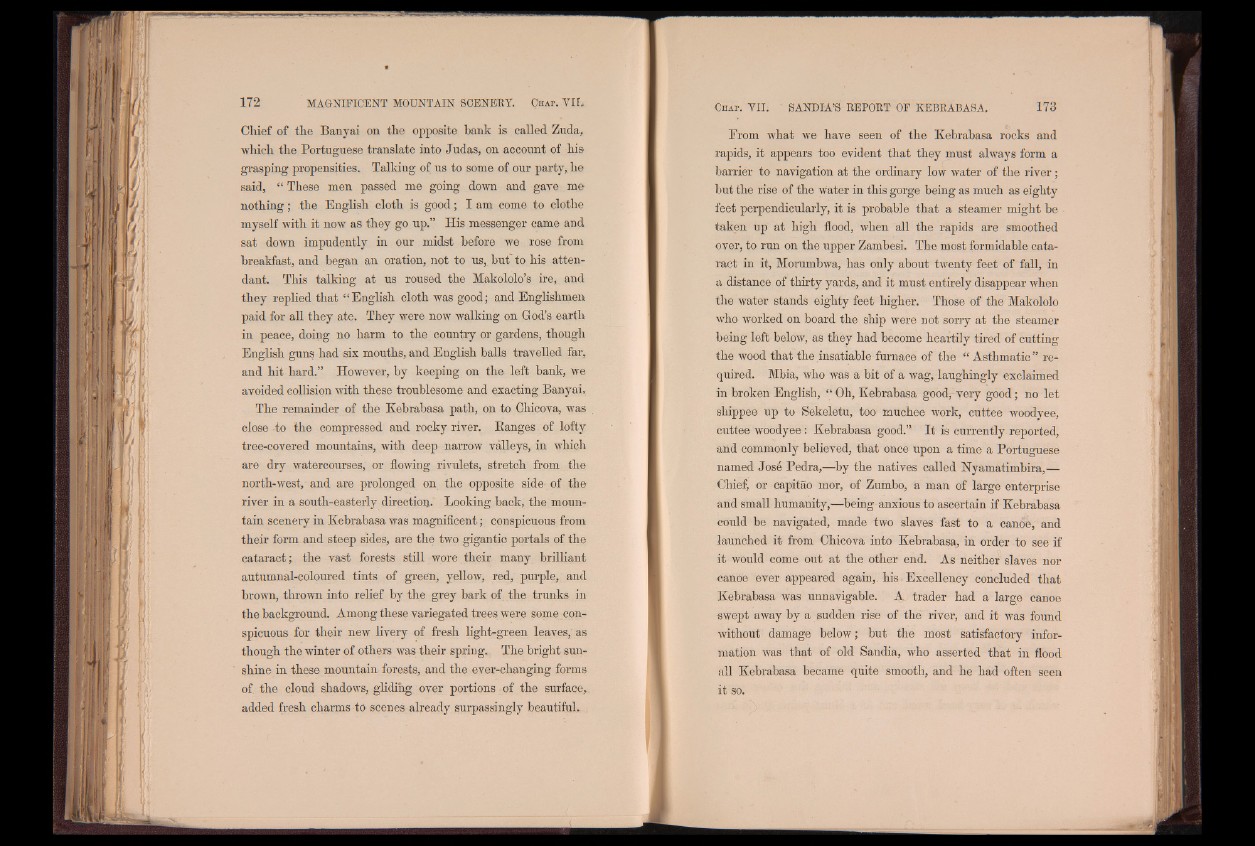
Chief of the Banyai on the opposite bank is called Zuda,
which the Portuguese translate into Judas, on account of his
grasping propensities. Talking of us to some of our party, he
said, “ These men passed me going down and gave me
nothing; the English cloth is good; I am come to clothe
myself with it now as they go up.” His messenger came and
sat down impudently in our midst before we rose from
breakfast, and began an oration, not to us, but to his attendant.
This talking at us roused the Makololo’s ire, and
they replied that “ English cloth was good; and Englishmen
paid for all they ate. They were now walking on God’s earth
in peace, doing no harm to the country or gardens, though
English guns had six mouths, and English balls travelled far,
and hit hard.” However, by keeping on the left bank, we
avoided collision with these troublesome and exacting Banyai,
The remainder of the Kebrabasa path, on to Chicova, was
close to the compressed and rocky river. Banges of lofty
tree-covered mountains, with deep narrow valleys, in which
are dry watercourses, or flowing rivulets, stretch from the
north-west, and are prolonged on the opposite side- of the
river in a south-easterly direction. Looking back, the mountain
scenery in Kebrabasa was magnificent; conspicuous from
their form and steep sides, are the two gigantic portals of the
cataract; the vast forests still wore their many brilliant
autumnal-coloured tints of green, yellow, red, purple, and
brown, thrown into relief by the grey bark of the trunks in
the background. Among these variegated trees were some conspicuous
for their new livery of fresh light-green leaves, as
though the winter of others was their spring. The bright sunshine
in these mountain forests, and the ever-changing forms
of the cloud shadows, gliding over portions of the surface,
added fresh charms to scenes already surpassingly beautiful.
From what we have seen of the Kebrabasa rocks and
rapids, it appears too evident that they must always form a
barrier to navigation at the ordinary low water of the river ;
but the rise of the water in this gorge being as much as eighty
feet perpendicularly, it is probable that a steamer might be
taken up at high flood, when all the rapids are smoothed
over, to run on the upper Zambesi. The most formidable cataract
in it, Morumbwa, has only about twenty feet of fall, in
a distance of thirty yards, and it must entirely disappear when
the water stands eighty feet higher. Those of the Makololo
who worked on board the ship were not sorry at the steamer
being left below, as they had become heartily tired of cutting
the wood that the insatiable furnace of the “ Asthmatic” required.
Mbia, who was a bit of a wag, laughingly exclaimed
in broken English, “ Oh, Kebrabasa good, very good ; no let
shippee up to Sekeletu, too muchee work, cuttee woodyee,
euttee woodyee : Kebrabasa good.” It is currently reported,
and commonly believed, that once upon a time a Portuguese
named José Pedra,—by the natives called Nyamatimbira,—
Chief, or capitâo mor, of Zumbo, a man of large enterprise
and small humanity,—being anxious to ascertain if Kebrabasa
could be navigated, made two slaves fast to a canbè, and
launched it from Chicova into Kebrabasa., in order to see if
it would come out at the other end. As neither slaves nor
canoe ever appeared again,, his.Excellency concluded that
Kebrabasa was unnavigable. A trader had a large canoe
swept away by a sudden rise of the river, and it was found
without damage below; but the most satisfactory information
was that of old Sandia, who asserted that in flood
all Kebrabasa became quite smooth, and he had often seen
it so.